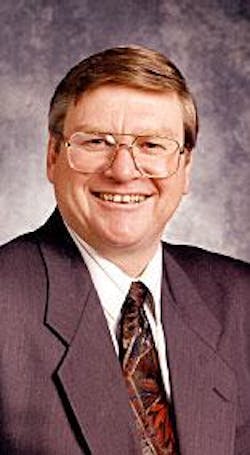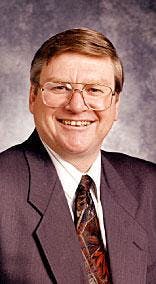POINT OF VIEW Syncrude's Newell: Managing growth, Kyoto top worries
Managing explosive growth at the technical, financial, and human level is the biggest challenge facing companies in developing a 300 billion resource in Canada's northern Alberta oil sands industry.
Eric Newell, chairman and CEO of Calgary-based Syncrude Canada Ltd., the world's largest oil sands operator, says massive development now under way puts great stress on the region and its main community of Fort McMurray. Newell says business leaders in the oil sector involved in large-scale projects must achieve a balance among three bottom lines:business, community, and the environment.
He says neglecting any one of these areas can lead to big trouble.
Syncrude plans $2 billion (Can.) in capital investment in 2002, most of it for expansion, and the company has a production target this year of 85-90 million bbl of Syncrude Sweet Blend light crude.
During Newell's tenure, Syncrude has surpassed the 1 billion bbl production benchmark and is on track to producing 25% of Canada's crude oil by 2007.
Oil sands boom
Newell, an oil sands veteran, chaired a federal National Oil Sands Task Force that created a new development plan in 1995, spawning incentives that have sparked a major oil sands boom.
"The region is bearing the brunt of a $50 billion (Can.) investment in a 10-year period. It's just mind-boggling," Newell said.
"We've already spent $17 billion and another $7 billion is committed, for $24 billion in the bag. There may be another $25 billion in the next decade, included in about $60 billion in projects under evaluation right now."
Newell says managing this magnitude of expansion requires close coordination among operators and contractors, governmental agencies, and local communities, including First Nations and Metis indigenous groups in the region.
He says the responsibility of operators goes well beyond operational and technical management to include issues such as environmental responsibility, affordable housing, road expansion, and even child care.
A number of mechanisms has been established to try to ensure that growth can be effectively planned, including a Cumulative Effects Management Association.
"We formed this group so that whenever a new project is announced, we don't just look at it in isolation. We redo everything in terms of what is the cumulative impact of that project," Newell said.
Newell notes that, despite planning efforts, recent oil sands megaprojects have run into significant cost overruns of 20% or more, partially because of a shortage of skilled labor.
Changing markets
The Syncrude executive says oil sands expansion is being driven by burgeoning demand for crude oil in the US.
"Conventional crude oil production is declining in Canada and even more rapidly in the US. We are in a kind of a race for that market with Venezuela and others. We are pushing down from the north, and they are pushing up from the Gulf [of Mexico]," Newell said.
"The parity point is Chicago, but we are even getting into markets south of there now, with new pipeline systems such as the Express Pipeline."
Newell predicts that, by 2010, oil sands will account for more than 50% of Canada's crude oil production, and the population of Fort McMurray will grow from its current 50,000 to as much as 75,000. There is currently also a large "shadow" population of 10,000 in the area, comprising workers living in camps and working on specific projects.
New techniques
Newell says the long-term future development of oil sands and its technically recoverable potential resource pegged at 300 billion bbl lies in in situ recovery techniques that can recover bitumen too deep for surface mining.
He says about 20% of the reserves are recoverable by surface mining, but 80% will require in situ techniques such as steam-assisted gravity drainage (SAGD).
"In situ is the exciting new technology, and projects are now being developed by companies such as Petro-Canada, Suncor [Energy] Inc. and Conoco Canada [Ltd.]," he said. "However, Syncrude, Suncor, and Shell Canada [Ltd.] are all developing surface mining projects at a fast rate, and we all have plans ultimately to go over 500,000 b/d in production" (see related story, p. 24).
Kyoto threat
If there's an area of concern that could dampen the current thrust of oil sands development, Newell says it is Canada's position on ratification of the Kyoto protocol on emissions of greenhouse gases (GHG).
The treaty calls on Canada to reduce its GHG emissions by 2012 to 6% below levels produced in 1990. Canada has not yet ratified the agreement, and the treaty faces stiff opposition from the petroleum industry and manufacturers that say it could have a disastrous economic impact. Alberta is proposing a made-in-Canada solution with a longer period to reach emissions targets.
Newell says the oil sands industry is pretty responsible and has a good track record in reducing emissions. He says there will be a 45%/bbl reduction in oil sands industry GHG emissions from 1990 to 2010.
"The trouble is our production is increasing fivefold, and our absolute emissions are going up. We feel pretty vulnerable as an industry," Newell said.
"I remain cautiously optimistic. I think people are beginning to understand when you explain to them that, if you add [that emissions curtailment cost] to our [overall costs], we can't recover that cost in the market, because we are competing with Venezuela, Mexico, Nigeria, and Saudi Arabia. None of them are signatories to Kyoto. As easy as you turn on oil sands investment, you can turn it off. That's what my concern would be. Maybe we can find a solution."
Career highlights
Syncrude Canada Ltd.
Eric Newell is a former president of the Alberta Chamber of Resources and chaired a National Oil Sands Task Force that drew a blueprint for oil sands development and resulted in incentives to investment.
Employment
Newell was appointed chairman of the Syncrude Canada Ltd. board in May 1994. He has been CEO of Syncrude since August 1989 and served as president from 1989 to 1997.
Prior to that, he served in executive positions with Imperial Oil Ltd. and Esso Petroleum Canada.
Education
He holds a masters in management studies from the University of Birmingham and a bachelor of applied science in chemical engineering from the University of British Columbia.

